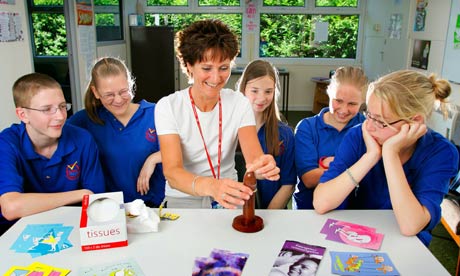
There was definitely a sense, says 19-year-old Andre Anderson, that the sex education teachers at his secondary school "viewed us as 'just kids' and thought 'they shouldn't be doing it, so they don't need to know'. They tell you how a baby is made, but there were loads of teenage pregnancies around so we knew that. The media teaches you a lot about sex, but it's like education tries to hide it from you."
With experiences like this, it's hardly surprising that a new study commissioned by Brook, the sexual advice service for young people, found nearly half of secondary-school pupils find their sex and relationship education (SRE) lacking, while just 6% of young people said they got the information about relationships they need from SRE lessons.
Shockingly, the study of more than 2,000 14- to 18-year-olds revealed that worrying myths still prevailed: 59% have heard that a woman can't get pregnant if the man doesn't ejaculate inside her, 33% have heard that you can't get pregnant the first time you have sex and a quarter of young people have heard you can only catch HIV if you are gay. Meanwhile, one in four pupils get no SRE in school, and a quarter of those who do say they don't think it is taught well.
Simon Blake, national director of Brook, isn't surprised. "We are told by the young people who access our services it is too little, too late, too biological," he says. "And what they really want is emotions, real life dilemmas and much more about relationships."
Is it a peculiarly British affliction to be so inept when it comes to talking about sex? "We certainly do have a British approach to young people and this topic unfortunately does still get politicised, rather than it just being another area of learning."
You only have to look at the controversy whipped up by groups such as the Christian Institute, whose recent report Too Much, Too Young complained that children were being shown "explicit" images in primary school sex education, or the Conservative MP Nadine Dorries' recent bill to teach abstinence in schools – but only for girls – to see what a battleground SRE can become. And in the meantime, say organisations such as Brook, sex education is patchy and young people rely on their friends for information (while frighteningly, the study shows, 5% — around the same level who learn most from asking their parents – of it comes from internet porn).
Brook's research follows a study published, last month, which found a rise, over the last two years, in the number of 16- to 19-year-olds having unprotected sex with a new partner. In that survey, 19% of young women, and 16% of young men, said they had not received any kind of sex education in school. And last year, the Health Protection Agency reported record levels of the numbers of STIs, with two thirds of the cases in young women.
It is compulsory for schools to teach the biology of reproduction, but not sex and relationships education, although government guidance is that they should as part of personal, social and health education (PHSE). "There isn't enough curriculum time, and because it is not compulsory, sex education classes are largely left to chance," says Blake. "We hear all the time that teachers would like to teach it better but they don't have the training and support to do so."
He thinks it is ridiculous that there is any controversy about sex education in primary school. "[Those lessons] are not about teaching them about sex, it's teaching them about body parts, relationships, teaching them about being a boy or a girl, how to be nice to each other. It is shocking that there are girls starting their periods without anybody explaining it to them."
To counteract this, Brook is launching a campaign to encourage teenagers to have their say about SRE teaching, and will present the findings to the Department of Education, which is conducting a review of PSHE, due to be published later this year.
Sophie Wilson, 17, remembers a couple of SRE lessons in primary school, then a couple during her first years in secondary school. "Those were mostly about different STIs and condoms, but there wasn't a lot about what to do if you got an STI. There was nothing about different relationships like same-sex." It wasn't until she was 17 that there was a lesson on how to get tested for an STI. It would be useful, she says, if lessons could cover wider issues, such as rape or abusive relationships too.
Wilson says her SRE didn't prepare her for adulthood. Most of the information about sex she has got comes from "my friends, from general things that have happened to them. The Sex Education show [on Channel 4] was good because it was quite direct. I guess it's just stuff I've heard around." The danger of that, she acknowledges, is you don't know how reliable it is. "The other danger is people might think they should just get [sex] over with and see what happens and learn from experience."
How was it for you? Is sex education in schools good enough?
• For more information see brook.org.uk

